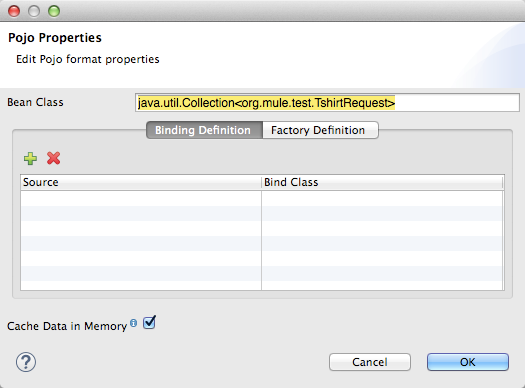
POJO Class Bindings and Factory Classes
| Mule Runtime Engine versions 3.5, 3.6, and 3.7 reached End of Life on or before January 25, 2020. For more information, contact your Customer Success Manager to determine how you can migrate to the latest Mule version. |
Anypoint DataMapper allows you to map an interface or abstract class as a POJO. Binding, in this case, refers to linking your POJO (which can be an interface or abstract class) to a concrete class. Thus, when instantiating your POJO, Mule uses the concrete class you specified.
Factory classes allow you to delegate object construction to another class. In this case, your factory class must have a static method called create, that returns the object you want to instantiate.
Assumptions
This document assumes the reader is familiar with the Anypoint DataMapper Transformer. Consult the DataMapper User Guide and Reference document for details. For a listing of all available tools in DataMapper, consult DataMapper Visual Reference.
Setting POJO Binding and Factory Definitions
-
To specify bindings and factories, open the Properties dialog by clicking the cog icon (highlighted below) in the Output mapping pane of the DataMapper view. The Properties icon displays the output Pojo Properties window (below, bottom).


-
Click Binding Definition or Factory Definition to add, remove or edit binding or factory properties.
-
Uncheck the Cache Data in Memory checkbox if you want DataMapper to cache process data to disk instead of in memory.
-
Click OK to save your changes.



